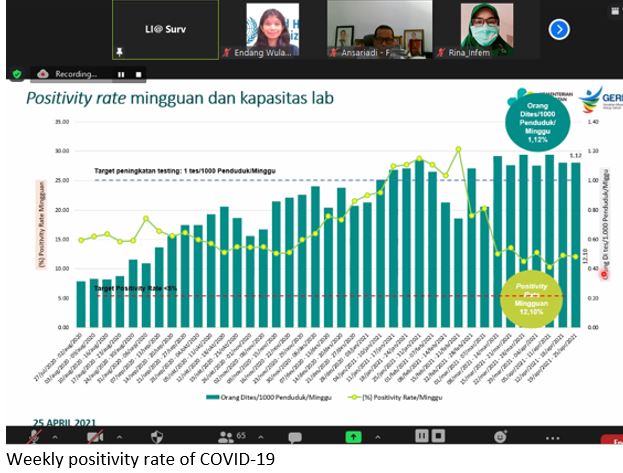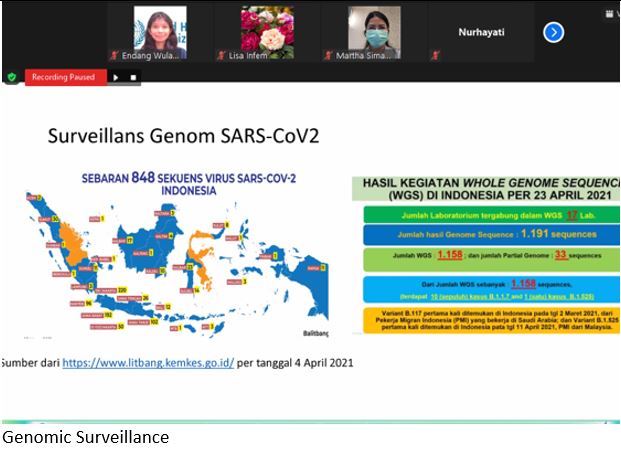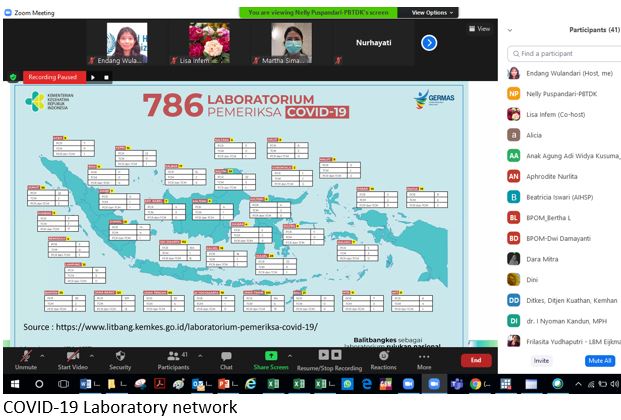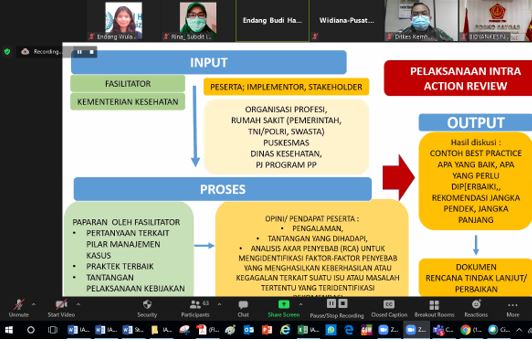
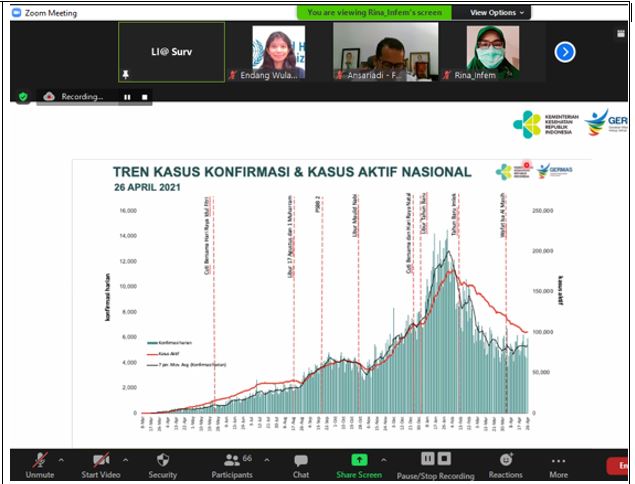
MoH presented situation analysis as part of surveillance component of COVID-19 strategic response. Credit: WHO/Endang Wulandari
The intra-action review (IAR) is a comprehensive multisectoral review to identify gaps and opportunities for learning from and improving the COVID‑19 response. Between 11-14 August 2020, WHO supported the Ministry of Health (MoH) to conduct the IAR that provided a set of recommendations for COVID-19 response.
MoH conducted regular monitoring of IAR recommendation implementation and COVID-19 health sector response plan indicators. The first monitoring meeting was held on 26-27 November 2020, the second on 9-10 February 2021, and the third on 27-29 April. The meeting also served tomonitor the COVID-19 response plan implementation. Participants discussed the ten IAR pillars: 1) command and coordination; (2) risk communication and community empowerment; (3) surveillance, rapid response teams and case investigation; (4) points of entry, international travel, and transport; (5) laboratory; (6) infection control; (7) case management; (8) operational and logistics support; (9) maintaining essential health services and systems; and (10) vaccination.
A total of 68 participants attended the meeting, including the Cabinet Secretary, National Disaster Management Agency (BNPB), Coordinating Ministry of Human Development and Culture, Ministry of Home Affairs, Ministry of Defence, professional organizations, Ministry of Information and Communication, Indonesia Food and Drug Authority (BPOM), point of entry officers, provincial health offices, hospitals, international organizations, and other development partners.
MoH officials in charge of each pillar presented achievements of the COVID-19 response plan and IAR recommendation implementation and underlined the challenges and gaps. Outstanding achievements included trainings on contact tracing, case management and infection control; expansion of the laboratory network to 792 labs; expansion of referral hospitals to 982 hospitals; updating needs of logistics using Essential Supply Forecasting Tool (ESFT) and online logistics reporting. Another major achievement included mapping of comorbidities using the healthy family application by primary healthcare centres. The COVID-19 response at points of entry (PoE) continued to maintain the capacity to screen travellers and the implementation of electronic e-Health Alert Cards (e-HAC). They also raised vigilance for screening of international travellers considering the surge of cases in other countries such as India. Hotlines 119 and 117 continue to operate.
The IAR highlighted the need to be vigilant to ensure implementation of the COVID-19 protocol, use of masks, hand hygiene and physical distancing during the upcoming holiday season and Idul Fitri. Participants also raised concern on the new variants of COVID-19, including those detected in Indonesia.
Recommendations to further strengthen the national COVID-19 response:
- Support review and monitoring of provincial COVID-19 response planning and IAR.
- Improve information sharing, regular resource mapping and stockpiling on logistics, reporting on Personal Protective Equipment (PPEs), laboratory supplies and medical equipment for the COVID-19 response.
- Evaluation of COVID-19 surveillance system and training on surveillance, case management, infection control and evaluation of risk communication.
- Continue to improve completeness, timeliness, verification and data validation and analysis for COVID-19 report through New All Record (NAR), Silacak contact tracing, Silaphar daily reporting application, SIRS hospital information online system, SISRUTE (information system for referral) and ILI, SARI sentinel surveillance.
- Bridging NAR and electronic Health Alert Card (e-HAC) and vaccine certificate with peduli lindungi application.
- Reduce COVID-19 stigma in communities to enable smooth contact tracing and response.
- Community empowerment to support contact tracing and monitoring of contacts involving health and community cadres and public health/medical students.
- Weekly report monitoring of indicators of adjusting public health measures at district levels.
- Improve the strategy and implementation for genomic surveillance by involving multisectoral stakeholders to reach 600 samples with whole genome sequencing per month.
- Improve coordination among points of entries and provincial and district health officers on the use of e-HAC data to monitor travellers and contact tracing.
- Continuous efforts for community engagement by involving religious leaders and community leaders in collaboration with the Ministry of Home Affairs, the Ministry of Religious Affairs and non-government organizations for COVID-19 prevention and control.
- Continue Indonesia’s participation and continuation in the solidarity trial.
- Adoption of WHO Case Reporting Form (CRF) for trial at seven hospitals and expansion of its implementation.
- Improve completeness of hospital readiness checklist and follow up actions to fill in the gaps identified in the survey findings and development of hospital contingency planning to anticipate surge of cases.
- Follow up actions to fill in gaps indicated in the findings of oxygen survey.
- Finalize and disseminate 6th COVID-19 guideline revision.
- Improve the monitoring of infection control in community including public places, offices, and special attention to the school.
- Monitor COVID-19 healthcare waste including vaccinations.
- Develop standard tool and conduct medical audits for healthcare workers infected by COVID-19.
- Conduct Training of Trainers (ToT) for polymerase chain reaction (PCR) training followed by cascaded trainings and conduct workshop series on laboratory diagnostics.
- Evaluation of antigen detection Rapid Diagnostic Tests (RDT).
- While MoH supports reagents for laboratory network, sub national government are urged to allocate sufficient budget for laboratory consumables.
- Improve virtual consultation, telemedicine and mobile health to support continuation of essential services.
- Improve vaccine coverage especially for elderly, vaccine effectiveness study, integration of vaccination reporting application, continue monitoring of quality, safety of vaccine in collaboration with BPOM.
The IAR monitoring meeting engaged all stakeholders together again to systematically review the critical actions and formulate recommendations to improve COVID-19 response. At the end of the event, all participants agreed that continuous regular monitoring of COVID-19 response and IAR recommendations implementation is crucial to identify gaps and prompt corrective actions to improve the COVID‑19 response in Indonesia.
